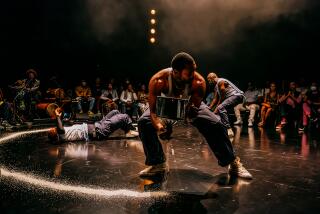Fine Revival Burnishes ‘Master Harold’
When it first appeared in 1982, Athol Fugard’s “ ‘Master Harold’ . . . and the Boys” was plainly about racism, elevated by Fugard’s brilliant sense of dramatic moment and metaphor, which rose above the specifics of Fugard’s own fractured South Africa.
The burning issue of South African apartheid tended to shadow all of Fugard’s work. The theme of buried, suddenly erupting racism and its roots in self-loathing connected with American audiences. In early productions, Fugard’s tense, tragic exchanges were just as easily imagined in 1950 Montgomery, Ala., as in the play’s 1950 Port Elizabeth.
Time hurts some plays and helps others. What it’s done for “Master Harold” is for the good. In a fine revival by the new Ascending Artists Stage Company under Nick Mize’s direction at the Grove Theatre Center/Burbank, Fugard’s drama has expanded. The racial divide is still there, but it’s clear Fugard had more on his mind. Highlighted in the trio of strong yet subdued performances by James Pass, Rich Ronat and James Geralden is the story’s furtive look at what it means to be a man.
Of course, Fugard meant this all along. It’s right there in the title. But the meaning was easily lost when the play was new, especially since both South African and American bigots had long used the word “boy” to denigrate black men. In this three-way exchange between Willie and Sam (Pass and Geralden), two black waiters in a Port Elizabeth tearoom, and Hallie (Ronat), born Harold, the white teenage son of the tearoom owner, nearly every aspect of what is required of a boy to find manhood is explored. Yet this is the last thing these three expect to discuss on a lazy, rainy day with nary a customer in sight.
It actually begins before Hallie enters the shop, bummed out from another boring day at school. Willie’s wiser elder, Sam, has kindly but firmly told his friend he can no longer expect to beat his woman one moment and expect her to join him in a ballroom dance competition the next. Although Willie has much growing up to do, Hallie seems stunted by comparison. Ronat implies this in a subtle, slow burn that broils under every line.
Geralden emphasizes Sam’s gentleness, allowing Hallie the same kind of slack a loving uncle would, as he has ever since this not-yet-a-man was little.
These are modulated, extremely well thought out performances driven by the desire to reexamine a superb but seemingly familiar and straightforward play. The device that turns Hallie from best of chums with Sam into an ugly, immature creature able to spit in Sam’s face is a series of phone calls that reinforces dual burdens--his handicapped father and his own shame.
Under Mize’s direction, these burdens become the boy’s mountain to climb. That Sam and Willie are black and easy targets is crucial but not overwhelming.
Unexpectedly, Ascending Artists’ debut offers a taste of what watching Fugard’s plays a century from now will be like, far from the raging, distracting headlines.
BE THERE
“ ‘Master Harold’ . . . and the Boys,” Grove Theatre Center/Burbank, 1100 W. Clark Ave., Burbank. Thursday-Saturday, 8 p.m.; Sunday, 2 p.m. Ends Feb. 17. $14.50-$17.50. (323) 655-8587. Running time: 1 hour, 45 minutes.
More to Read
The biggest entertainment stories
Get our big stories about Hollywood, film, television, music, arts, culture and more right in your inbox as soon as they publish.
You may occasionally receive promotional content from the Los Angeles Times.










